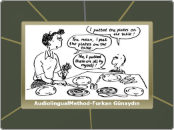
AudiolingualMethod-Furkan Günaydın

BACKGROUND
The Audio-Lingual Method was developed in the United States during World War II. At that time there was a need for people to learn foreign languages rapidly for military purposes.It was developed as a reaction to the grammar-translation method of teaching foreign languages. Grammar-translation had been used to teach for thousands of years, but the method was perceived as taking too long for learners to be able to speak in the target language. The Audio-Lingual method set out to achieve quick communicative competence through innovative methods. From about 1947-1967 the Audio-Lingual approach was the dominant foreign language teaching method in the United States.

GOALS
Using the target language communicatively
Listening comprehension
Teaching target language as quicly as possible
Learning the target language without stopping to think.
Correct pronunciation
Native-Like production
ROLES

TEACHER'S ROLE
Teacher has an active role in CLR.
Teacher is like an orchestra leader,directing and controlling the language behaviour of other students.
Teacher is responsiple for providing SS with a good model for imitation.

STUDENT'S ROLE
Students are imitators of teacher or the tapes she supplies.
Students follow teacher's directions and respond as quickly as possible.
Very little controll over the pace and content
ADVANTAGES
Effective and meaningful vocabulary learning
Fluent Speaking
Contextual Learning
Good pronunciation
Effective Grammar Learning
DISADVANTAGES
Drills are boring
Bad reading and writing skills
Unnatural conversation
Repetitions are time consuming
Teachers prevent students from invidual learning
Appliying the Method

Techniques
Diologue Memorization
Diologue completion
Minimal pairs
Grammar games
Drills
Single-Slot substitution
Chain
Repetition
Multiple-Slot substitution
Transfomation
Answer and Question

Materials Used in CLR
Audial Materials like tape-recorders
Visual materials like projection equipment
Language Labs

PRINCIPLES
Teacher is the model of ss.
Students are the imitators of teacher.
Written work is limited.
Target language is used.
Learning through communication is essential.
